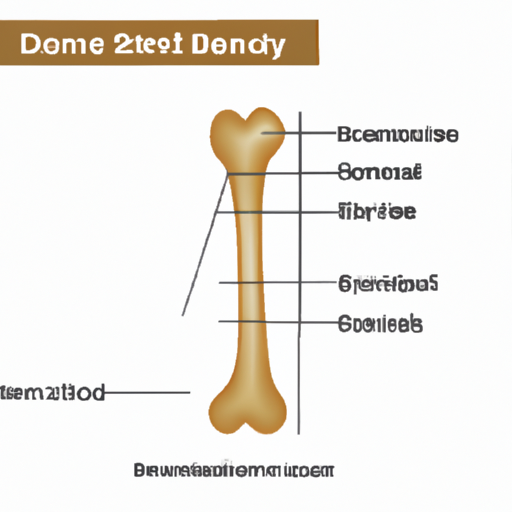In the article, “Understanding the Connection Between Collagen and Bone Density Loss,” we explore the intriguing correlation between collagen and bone density loss.
This thought-provoking piece delves into the intricate relationship that exists between these two factors, aiming to shed light on the potential impact of collagen on bone health.
Through analyzing scientific research and expert opinions, this article aims to enhance your understanding of how collagen may play a significant role in bone density loss and its implications for overall bone health.
Click Here if You Prefer to Listen to Quick Summary Content of the Blog Post about The Collagen Bone Density
Understanding the Connection Between Collagen and Bone Density Loss
The Role of Collagen in Bone Health
Collagen is a crucial protein in the human body, constituting around 30% of our total protein content. It plays a fundamental role in maintaining the strength and integrity of various tissues, including bones.
In the context of bone health, collagen is the principal element of the extracellular matrix found in bones. It provides the framework for mineralization, ensuring the structural stability and resilience of the skeletal system.
The Relationship Between Collagen and Bone Density Loss
Bone density loss, also known as osteoporosis, occurs when bones become weak and porous. Collagen depletion is closely associated with this condition. As we age, the production of collagen diminishes, resulting in a decline in bone mineral density.
Low levels of collagen compromise the ability of bones to absorb calcium and other minerals necessary for their strength and resilience. Consequently, bone density decreases, making them more prone to fractures and injuries.
Factors Contributing to Collagen and Bone Density Loss
Several factors contribute to collagen and bone density loss. Aging is one of the primary causes. As we grow older, the production of collagen decreases, leading to reduced bone strength and density. Hormonal changes, particularly in women during menopause, can also accelerate the rate of collagen and bone density loss.
Additionally, a sedentary lifestyle, certain medical conditions (such as celiac disease or rheumatoid arthritis), smoking, excessive alcohol consumption, and a diet low in calcium and vitamin D can contribute to collagen and bone density loss.
Signs and Symptoms of Collagen and Bone Density Loss
Collagen and bone density loss often go unnoticed until a fracture or bone-related injury occurs. However, certain signs and symptoms can indicate the presence of this condition.
These may include frequent fractures, loss of height, stooped posture, back pain, a decrease in grip strength, and dental problems. Individuals experiencing any of these symptoms should consult a healthcare professional for further evaluation and diagnosis.
Testing and Diagnosis of Collagen and Bone Density Loss
To diagnose collagen and bone density loss, healthcare professionals typically use a dual-energy X-ray absorptiometry (DXA) scan, which measures bone mineral density. This non-invasive test compares an individual’s bone density with the average density observed in healthy young adults.
The results are usually presented as T-scores, indicating how the individual’s bone density compares to the average. A T-score between -1 and -2.5 indicates low bone density (osteopenia), while a T-score below -2.5 signifies osteoporosis.

Prevention and Management of Collagen and Bone Density Loss
Preventing and managing collagen and bone density loss requires a multifaceted approach. Lifestyle modifications and medical interventions play a critical role in maintaining bone health.
Lifestyle Changes to Improve Collagen and Bone Density
Engaging in weight-bearing exercises, such as walking, jogging, or weightlifting, can help stimulate collagen production and improve bone density.
Additionally, quitting smoking and reducing alcohol consumption are crucial steps in preventing collagen and bone density loss. Consuming a balanced diet rich in calcium, vitamin D, and other essential nutrients is also important for bone health.
The Impact of Nutrition on Collagen and Bone Density
Proper nutrition has a direct impact on collagen synthesis and overall bone health. Foods rich in collagen-boosting nutrients, such as vitamin C, zinc, copper, and sulfur, are beneficial for maintaining healthy bone density.
Additionally, incorporating calcium-rich foods like dairy products, leafy greens, and fortified foods into the diet can enhance bone strength. Adequate vitamin D intake is also crucial, as it facilitates calcium absorption and utilization.
Exercise and Physical Activity for Collagen and Bone Health
Regular exercise and physical activity play a significant role in preventing collagen and bone density loss. Weight-bearing exercises, resistance training, and balance exercises can help stimulate collagen production, enhance bone density, and promote overall bone health.
These activities help to create a natural response in the body, triggering the deposition of mineralized tissue, strengthening the bone structure, and reducing the risk of fractures.
Current Medical Treatments for Collagen and Bone Density Loss
In cases of severe collagen and bone density loss, medical interventions may be necessary. Hormone replacement therapy (HRT) can be used to address the hormonal imbalances that contribute to bone loss, particularly in postmenopausal women.
Medications such as bisphosphonates, selective estrogen receptor modulators (SERMs), and denosumab can also be prescribed to slow down bone loss and reduce the risk of fractures in individuals with osteoporosis.
However, the use of these medications should be carefully evaluated and monitored by healthcare professionals to ensure their effectiveness and minimize potential side effects.
In conclusion, understanding the connection between collagen and bone density loss is essential for maintaining optimal bone health. Collagen depletion is a significant factor in bone density loss, and several factors contribute to this condition.
Detecting and managing collagen and bone density loss require a comprehensive approach, combining lifestyle modifications, proper nutrition, regular exercise, and, when necessary, medical treatments.
By taking proactive steps to improve collagen synthesis and supporting bone health, individuals can reduce the risk of fractures and lead a healthy, active life.

